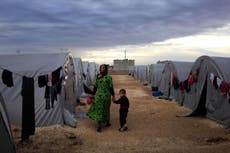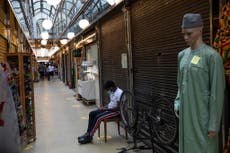10 years after the crisis in Syria began, let’s show refugees we haven’t forgotten them
The Syrian families I have met with the UNHCR all held the same hope: to begin rebuilding their lives. Most of them want to return, but time and again those dreams have been dashed

Back in 2019, I met Mohammed and his wife Muna, Syrian refugees in Egypt. Their hope, like the 5.6 million Syrian refugees still in the region, was that the war would end “soon”.
Time and again those dreams have been dashed. Ten years since peaceful demonstrations in 2011 morphed into a full-blown conflict – and the largest displacement crisis of our time – a lasting peace remains elusive. This crisis has now dragged on almost twice as long as the Second World War.
Muna lost a leg in a bombing and Mohammed received a shrapnel wound to his back, leaving him in constant pain. As a result, they became reliant on their son, Omran, who was employed as a delivery boy for 11 hours a day, six days a week – a 14-year-old supporting his parents and siblings.
The Syrian families I have met in Lebanon, Jordan and Egypt, with UNHCR, the UN Refugee Agency, all held the same hope: to begin rebuilding their lives. Most of them want to return, but the conditions in Syria mean that is often too dangerous.
Yet solutions for the millions of refugees still in limbo – plus the 6.7 million displaced inside Syria – appear scant, their living conditions made worse by the pandemic.
While sacrifices have been made across societies globally during the pandemic, spare a thought for the world’s 20.7 million refugees under the UNHCR’s mandate, most residing in lower income countries. For them, Covid-19 has been an emergency layered on existing emergencies. Precarity is rising. Many have lost jobs, unsure of where the next meal might come from. Most live in inadequate, flimsy shelters, and feel less secure than ever. Even before the pandemic, over one-third of school-aged Syrian refugee children did not have access to education.
A recent study by UNHCR and the World Bank shows that since the onset of Covid-19, close to 1 million Syrian refugees, along with 4.4 million members of their host communities in Jordan, Lebanon and the Kurdistan region of Iraq, may have fallen into poverty. In Lebanon, the situation is chronic. Nine in 10 Syrian refugees now live in extreme poverty, compared to 55 per cent in 2019. Inside Syria, eight in 10 people live below the poverty line.
These statistics show Syrians need assistance more than ever. In 2021, humanitarian and development actors will need $5.8bn (£4.1bn) to keep refugees afloat in the region. There are also more than 4.8 million people in need from local communities that have accommodated the refugees. Last year’s appeal only reached 53 per cent of the funding target, lower than previous years.
Mohammed and Muna were among the lucky few, managing to obtain resettlement to Ayrshire, Scotland, just over a year ago. Resettlement helps ensure the protection of those whose lives may be in danger or who have specific needs that cannot be addressed in the country where they have sought protection.
It is a tangible way that more fortunate societies, especially those that emphasise the importance of international solidarity, can help share the burden of the refugee crisis, rather than turning away.
The pandemic has seen resettlement fall to a record low. Since a peak in submissions in 2016, there has been a dramatic reduction of resettlement places in recent years. Despite an estimated 1.44 million refugees in urgent need of resettlement globally, only 22,770 were resettled through UNHCR last year.
In the UK, resettlement was put on hold in March 2020 and only a small number have arrived since. Here, families identified as most at risk by the UNHCR have moved to towns and cities across the country under the resettlement scheme. Imagine moving your life to a new culture. It’s not an easy process, especially for the elderly. Yet what has struck me is how many people have given their time to help them feel welcome and get back on their feet. Civil society has stepped up and I believe that Britain’s welcoming spirit is undimmed despite the many current challenges. Many have not forgotten the desperate plight of refugees and want to keep helping.
In Brent, I was able to reconnect with Maha and Talal, whom I had previously met in Lebanon, where they were living in a condemned building and unable to work. After being resettled to the UK, they were thriving. Resettlement was a lifeline for this family, and they were desperate to make it work, knuckling down to learn English and find work, to shape their own future, and pay back the community that helped them. They showed that resettlement works as a tool for hope and empowerment.
Let’s hope the UK government shows a clear commitment to continuing and expanding the scheme for the years to come.
We need to show Syrians that the world has not forgotten them. The country will rebuild. Until that happens, we can all try to help asylum seekers and refugees in our communities, support local authorities and volunteers, or donate to the charities that are helping them.
British actor David Morrissey has been supporting UNHCR, the UN Refugee Agency, since 2014 and has been a Goodwill Ambassador since March 2017. Visit www.unrefugees.org.uk to find out how you can support refugees and displaced people





Join our commenting forum
Join thought-provoking conversations, follow other Independent readers and see their replies